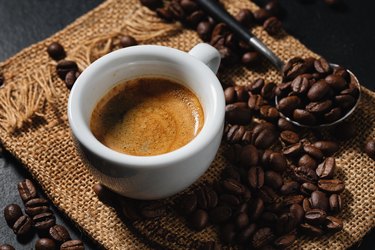
Irritable bowel syndrome (IBS) is a complex condition. Though it primarily impacts your digestive system, it can have a variety of causes, including problems with your nervous system, severe infections, stress, foods and more. Even that caffeine in your morning latte may be a trigger.
Dietary Triggers
Video of the Day
With symptoms such as abdominal pain, cramping, bloating, gas, diarrhea and constipation, it's not surprising that one of the primary triggers of IBS symptoms is diet. In fact, the Mayo Clinic lists it as one of the top three triggers of IBS symptoms, along with stress and hormones. Specifically, Mayo points to foods such as dairy products, citrus, cabbage, beans, wheat and carbonated beverages as potential triggers for IBS symptoms.
Video of the Day
"It's probably best to avoid gas-producing foods such as cruciferous vegetables, high sugars, high caffeine and high spices," says Lisa Ganjhu, DO, a gastroenterologist at NYU Langone Health in New York City. "All of these can stimulate an already-sensitive gut."
The Caffeine Connection
When it comes to caffeine and IBS, the evidence seems to point to a connection, although the messaging is somewhat mixed compared to what's known about foods that are clearly involved in triggering IBS symptoms.
Johns Hopkins Medicine, for example, lists caffeine among its top five food ingredients to avoid if you have irritable bowel syndrome. The rationale, Hopkins notes, is that caffeine can increase the risk for diarrhea, a primary symptom of IBS. For this reason, Hopkins recommends steering clear of foods such as tea, cola, coffee and even chocolate if you struggle with IBS symptoms.
"Some may benefit from reducing caffeine intake, as it can act as a stimulant and increase bowel movements," says Maya Feller, RD, CDN, a dietitian in private practice in Brooklyn, New York. NYU Langone Health also reinforces the notion that caffeine can be a potential IBS symptom trigger in some, grouping caffeine with alcohol and nicotine as ingredients that can stimulate the colon and lead to loose bowel movements or abdominal cramping.
Read more: A List of Foods That Contain Caffeine
Consider Carbs
However, NYU Langone Health also mentions that a number of sugars commonly found in foods may be more likely culprits than caffeine. These include what are known as FODMAPs — fermentable oligosaccharides, disaccharides, monosaccharides and polyols, which are types of carbohydrates that are not absorbed well by the intestines.
Doctors may recommend that people try avoiding these foods by following a low-FODMAP diet, to see if that alleviates their IBS symptoms. This involves avoiding foods such as some fruits, dairy products, beans, processed foods containing high-fructose corn syrup and more.
Norman Robillard, PhD, a microbiologist, founder of the Digestive Health Institute in Watertown, Massachusetts, and a gut health expert, agrees that carbohydrates are more likely culprits of IBS symptoms than caffeine. "I have heard people say coffee is acidic and that it's irritating for the gut," he says. "In my own consultation practice, I find that most, not all, people with IBS who strictly control their dietary carbohydrate levels can tolerate some coffee."
In fact, Robillard notes that coffee and other sources of caffeine may actually be helpful for some individuals who are fighting certain specific IBS symptoms. "One instance where coffee/caffeine may help is with some cases of constipation," he says. "A significant number of people I have worked with over the years report that coffee helps them to stay regular."
The Bottom Line
Though it can get a little confusing, the bottom line on IBS symptoms and caffeine is this: If you think that caffeine is exacerbating your IBS symptoms, then it's worth a try to cut it out of your routine. If it doesn't seem to bother you, then there's probably no reason to worry about it.
"The role of caffeine in IBS is not clear," says Marta Ferraz Valles, RD, LD, a dietitian at the Institute for Digestive Health and Liver Disease at Mercy Medical Center in Baltimore. "Some studies have shown that coffee and tea are among the foods associated with symptoms for some patients with IBS. If this is the case for you, caffeine should be restricted or avoided."
Read more: 11 Foods to Avoid When You Have IBS
- Lisa Ganjhu, DO, gastroenterologist, Division of Gastroenterology and Hepatology, NYU Langone Health, New York City
- Maya Feller, MS, RD, CDN, dietitian, private practice, Brooklyn, New York
- Marta Ferraz Valles, MA, RD, LD, dietitian/nutritionist, Institute for Digestive Health and Liver Disease, Mercy Medical Center, Baltimore
- Norman Robillard, PhD, microbiologist, founder, Digestive Health Institute, Watertown, Massachusetts
- Mayo Clinic: “Irritable Bowel Syndrome”
- Johns Hopkins Medicine: “5 Foods to Avoid If You Have IBS”
- NYU Langone Health: “Dietary Changes for Irritable Bowel Syndrome in Adults”